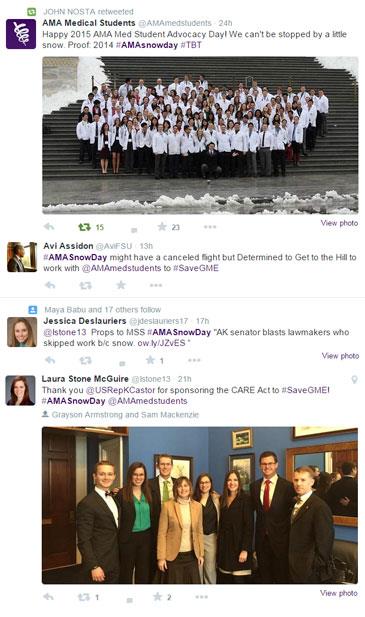
For the second year in a row, a winter storm that shut down Washington, D.C. Thursday and Friday didn’t deter more than 150 medical students from descending on Capitol Hill to ask Congress for new and innovative ways to fund graduate medical education (GME).
The Medical Student Advocacy Day gave students a crash course in effective lobbying techniques before unleashing them into the snow. Students trekked to the Hill to meet with lawmakers and discuss ways to make GME—which is essential to ensuring patient access to care—a more viable, sustainable program.
The students showed their support for legislation announced Thursday that would authorize grants for GME positions in states that have a low ratio of medical residents relative to the general population, targeting residency slots in needed areas.
The Creating Access to Residency Education (CARE) Act aims to create a $25 million grant program to expand or establish new residency training positions. The grants would increase existing funding by establishing partnerships with state, local government, community health centers or other organizations.
Students tweeted their support for this bipartisan bill and used social media to show that a little snow couldn’t keep medical students from making their voices heard.
The advocacy event dovetailed with the release of an Association of American Medical Colleges workforce study that found the nation could face a shortage of between 46,000 and 90,000 physicians by 2025. That breaks down to a shortfall of between 12,000 and 31,000 primary care physicians and 28,000 to 63,000 non-primary care physicians. The study is the first comprehensive national analysis that takes into account both demographics and recent changes to care delivery and payment methods
Besides legislator meetings, students also heard from Lt. Col. Robert Oh, MD, from the Office of the Surgeon General of the Army, and Sen. John Barrasso, MD, R-Wyo.
“As an orthopedic surgeon serving in the U.S. Senate, Dr. Barrasso provided a valuable perspective on how physicians can become intimately involved in policy and decision making in order to advance the betterment of our profession and our patients,” said Benjamin Meyer, a third-year medical student at the University of South Dakota-Sanford School of Medicine.
Participants also received training in how to discuss key issues for medical students, including student loan forgiveness, practice trends and the future of medicine.
Check out #AMAsnowday and #SaveGME on Twitter to see more on the medical students’ advocacy efforts, and read more about AMA advocacy on GME.




